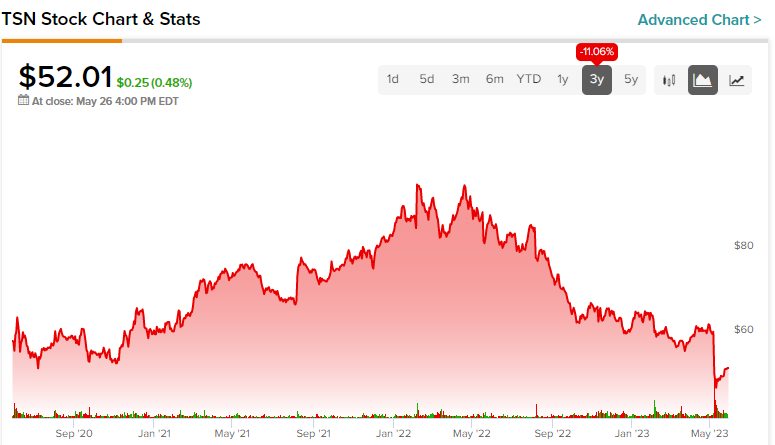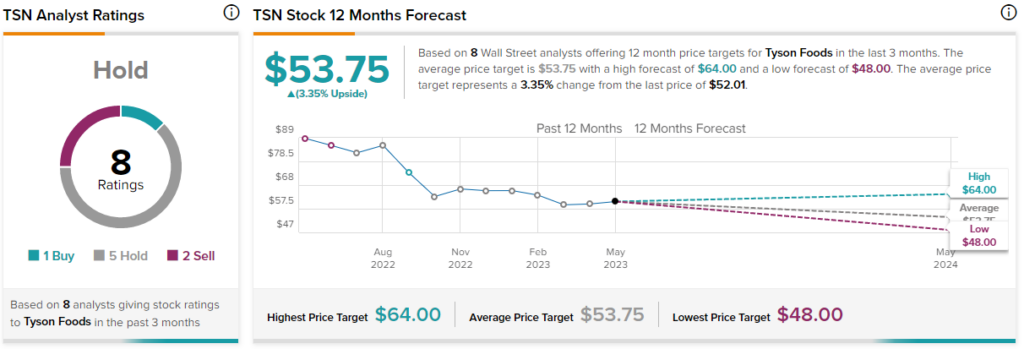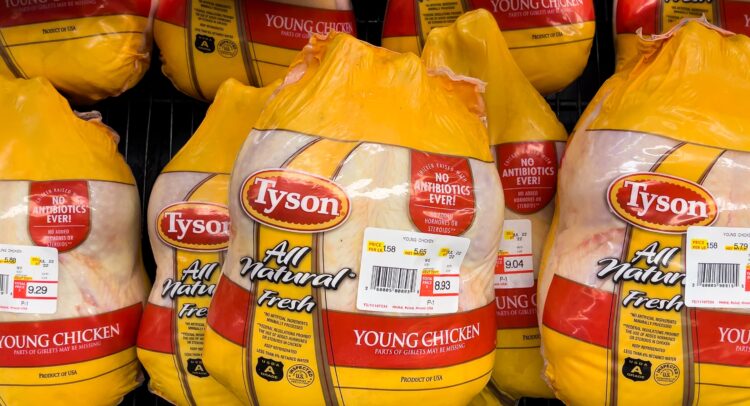Shares of Tyson Foods (NYSE:TSN) have declined significantly over the past year, falling by about 41.4% during this period. The beef, pork, chicken, and prepared foods giant has seen its profitability decline significantly lately as inflationary pressures have taken a toll on its margins and, consequently, on investors’ confidence.
Don't Miss our Black Friday Offers:
- Unlock your investing potential with TipRanks Premium - Now At 40% OFF!
- Make smarter investments with weekly expert stock picks from the Smart Investor Newsletter
With that being said, the prevailing challenges Tyson is currently facing are probably merely transitory. As a result, Tyson’s profitability is anticipated to experience a substantial resurgence in the upcoming year. Consequently, astute investors may be poised to reap substantial gains as they look ahead from the stock’s current price levels. Therefore, I am bullish on the stock.

Fiscal 2023: A Tough Year Compared to 2022
The previous two years marked a remarkable period of success for Tyson. They were truly exceptional for the company, characterized by a confluence of factors that led to outstanding trading results. The challenges posed by COVID-19-related supply chain constraints, along with a shortage of poultry and breeding stock supplies, combined with inflation-driven pricing hikes, all contributed to impressive results.
In fact, Tyson experienced significant revenue growth, notably surpassing its historical average. In particular, the company achieved a solid revenue increase of 9.0% in Fiscal 2021, followed by an impressive 13.3% advance in Fiscal 2022.
Moreover, Tyson’s prudent cost control measures resulted in expanded margins, further fueling its success during this time. As a direct consequence, the company witnessed a substantial 43.3% growth in earnings per share, reaching an impressive $8.28 in Fiscal 2021. Building upon this achievement, Tyson continued its upward trajectory in Fiscal 2022, with earnings per share rising by an additional 5.4% to a new record of $8.73.
Despite two extremely prosperous years for Tyson, Fiscal 2023 commenced on a weak note. While the company managed to sustain its revenues at record levels as demand for meat remained robust, inflationary costs suddenly caught up, exerting substantial pressure on its financial performance.
Specifically, in its fiscal Q2 results, the company posted sales came in at $13.1 billion, flat against its near-record Q2-2022 sales. Although beef volumes fell by 2.9%, pork and chicken volumes increased by 1.1% and 6.4%, respectively. Furthermore, while average selling prices in beef and pork fell by 5.4% and 10.3%, respectively, they rose by 2.0% and 1.6% in chicken, and prepared foods, respectively. Prepared food volumes were flat.
When it came to profitability, the numbers weren’t so pretty. Adjusted operating income totaled $418 million, recording a massive decline of 84% from the prior-year period. Hence, adjusted earnings per share came in at $0.82, also down 84% compared to Q2 2022. Clearly, the lack of last year’s momentum, efficiencies, and market dynamics impacted profitability severely.
Because of such a weak Q2, which came after a rather weak Q1 as well, consensus estimates for fiscal 2023 point toward earnings-per-share of about $1.62, suggesting a year-over-year decline of more than 80% from the previous year’s record levels.
Earnings Likely to Rebound Substantially from Fiscal 2024 Onwards
While current market and internal conditions have set the stage for Tyson to suffer a notable in profitability, the company’s earnings are likely to rebound significantly from Fiscal 2024 onwards. Although certain variables remain beyond its control, Tyson is strategically focusing on what it can influence, positioning itself to enhance profit margins in the upcoming year.
Notably, Tyson has taken decisive actions to drive improvement. During the quarter, the company successfully reduced its finished inventory pounds by nearly 20%. Furthermore, Tyson made the difficult but necessary decision to close two less productive chicken plants earlier this quarter. These strategic measures are anticipated to generate significant efficiencies moving forward, despite incurring incremental costs in this year’s results.
Tyson is also committed to investing in automation and digital capabilities, presenting opportunities for enhancing its yield. Notably, the company has implemented fully-automated debone lines, totaling 50 in number. Management believes that this investment will lead to an improved cost structure in the income statement, further strengthening Tyson’s financial position.
Seeing these developments, along with further cost management, has led consensus estimates for Fiscal 2024 to expect earnings per share of about $3.79. Further, earnings per share of $5.37 are expected in Fiscal 2025. A gradual positive earnings growth trajectory toward Tyson’s Fiscal 2022 record profit levels is expected thereafter.
Is TSN Stock a Buy, According to Analysts?
Turning to Wall Street, Tyson Foods has a Hold consensus rating based on one Buy, five Holds, and two Sell ratings assigned in the past three months. At $53.75, the average Tyson Foods stock forecast suggests 3.35% upside potential.

The Takeaway
Tyson Foods has faced significant challenges, leading to a decline in profitability and a drop in investor confidence. However, these challenges are expected to be temporary, and the company is poised for a substantial resurgence in profitability in the upcoming year. Despite a tough year far, Tyson’s previous success and strategic measures, including inventory reduction and investments in automation, position it for future growth.
Consensus estimates anticipate a rebound in earnings from Fiscal 2024 onwards, set to gradually approach record profit levels achieved in Fiscal 2022 in the following years. Thus, the stock’s investment case could be quite meaty, given its recent plunge.



















